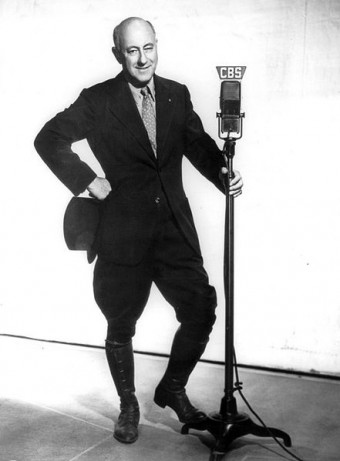This Day in History: March 19th
Today in History: March 19, 1953
 On March 19, 1953, after almost 40 years of making movies, pioneering director Cecil B. DeMille was finally awarded an Oscar: “Best Picture” for his movie The Greatest Show on Earth, starring Charlton Heston and Betty Hutton.
On March 19, 1953, after almost 40 years of making movies, pioneering director Cecil B. DeMille was finally awarded an Oscar: “Best Picture” for his movie The Greatest Show on Earth, starring Charlton Heston and Betty Hutton.
DeMille was one of the visionaries behind the creation of the motion picture. Along with Jesse Lasky and Samuel Goldwyn, he formed Paramount pictures in 1913, and the following year released Hollywood’s first feature length film, The Squaw Man.
In 1914, DeMille began his wildly successful writing collaboration with Jeanie Macpherson that lasted until her death in 1946. He helped launch the career of silent screen superstar Gloria Swanson with such clever romantic farces as Don’t Change Your Husband in 1919 (although he downplayed his part by saying “The public, not I, made Gloria Swanson a star.”)
Swanson was not the only fledgling talent DeMille sniffed out during Hollywood’s early years. The roster of DeMille protégées included such Hollywood luminaries as Wallace Reid, Bebe Daniels, Geraldine Farrar, Paulette Goddard, Charlton Heston and Gary Cooper, to name but a few.
Cecil B. DeMille did everything in a big way. No matter what the subject – and he ran the gamut from drama to comedy, biblical epics to historical spectaculars – his films throughout his long career were always colorful (even the silents!), elaborate and sexy. DeMille was a master at balancing realism and escapism.
The actors he worked with were also caught under his spell. When Gloria Swanson published her autobiography Swanson on Swanson in 1980, her tone when referring to the man who called her “Young Fellow” was always reverent and worshipful. He had numerous touching reunions through the years with thankful stars who owed him a debt of gratitude for their success.
DeMille’s biblical epic King of Kings (1927) was immensely popular, and sensing he’d found a winning formula, De Mille released a series of big-budget biblical and historical spectacles throughout the next two decades. By the end of his career, he had around 70 films to his credit.
His films were rarely a big hit with the critics, but in the end what really matters is what the ticket-holders think, and they came out in droves for Demille’s pictures since the days of silent movies until the 1950s.
Cecil B. DeMille’s genius and invaluable contribution to Hollywood’s ascent was acknowledged in 1950 when a special Honarary Academy Award was presented to him for “37 years of brilliant showmanship.” The Golden Globes unveiled the Cecil B. DeMille Award for outstanding contributions to the world of entertainment in 1952. The first recipient was, fittingly, Cecil B. DeMille. In 1953, the year DeMille won his lone Oscar, he was also awarded the Irving G. Thalberg Memorial Award from the Academy of Motion Picture Arts and Sciences.
He died in 1959.
If you liked this article, you might also enjoy our new popular podcast, The BrainFood Show (iTunes, Spotify, Google Play Music, Feed), as well as:
- Why the Academy Awards are Called the “Oscars”
- Why the Emmys are Called the Emmys
- The Origin of the “Slipping on a Banana Peel” Comedy Gag
- A Few Things You May Not Know About Mel Brooks
| Share the Knowledge! |
|




